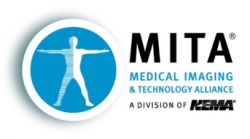MITA Applauds Congressional Effort Urging Coverage for Dense Breast Tomosynthesis (DBT) Screening for TRICARE Beneficiaries
Bipartisan group of 51 lawmakers urges TRICARE to cover DBT screening to enable more effective, less costly cancer detection.

Washington, DC, July 23, 2019 --(PR.com)-- The Medical Imaging & Technology Alliance (MITA) today applauded lawmakers for urging the Military Health System (MHS) – the agency responsible for administering the TRICARE health benefits for active and retired military personnel and their dependents – to include coverage of Dense Breast Tomosynthesis (DBT) screening in order to increase breast cancer detection and reduce the need for additional screening and biopsies. The effort is being lead by U.S. Representative Chrissy Houlahan (D-PA), chair of the newly established Servicewomen and Women Veteran's Caucus.
“We urge the MHS to add DBT coverage for TRICARE beneficiaries – as a more efficient method of screening, it will save lives and taxpayer dollars by detecting breast cancer at an earlier, less costly stage with a higher overall chance of survival,” the lawmakers write in a letter to Thomas McCaffery, Principal Deputy Assistant Secretary of Defense for Health Affairs who oversees TRICARE. “Lack of DBT coverage for TRICARE beneficiaries is putting the welfare of our nation’s service members, military families, and veterans at risk. We urge positive coverage and reimbursement decision for DBT effective immediately.”
“It is crucial that all women with dense breast tissue, including those covered by TRICARE, have access to the screening they need to mitigate their risk of not detecting a cancer,” said Patrick Hope, Executive Director of MITA. “MITA is proud to support this effort and applauds these lawmakers who are standing up for expanded access to this advanced, life-changing screening technology.”
TRICARE remains one of the few payers in the country that lacks coverage for DBT screening. In February, Congress enacted a law requiring mammography providers to notify patients with dense breast tissue so they can be recommended for further screening. This policy creates a situation where TRICARE beneficiaries may be denied coverage for a recommended screening and must choose between paying out-of-pocket for the procedure or forgoing this proven testing.
Approximately 40 percent of women over age 40 have dense breast tissue and are between four and six times more likely to develop breast cancer than women without dense breasts. The sensitivity of mammography for the detection of breast cancer is typically about 85 percent, but that sensitivity is reduced to approximately 50 percent for women with dense breast tissue. For these women, both their cancer and breast tissue appear white on mammograms.
The Medical Imaging & Technology Alliance (MITA), a division of NEMA, is the collective voice of medical imaging equipment manufacturers, innovators, and product developers. It represents companies whose sales comprise more than 90 percent of the global market for advanced medical imaging technology. For more information, visit www.medicalimaging.org. Follow MITA on Twitter @MITAToday.
“We urge the MHS to add DBT coverage for TRICARE beneficiaries – as a more efficient method of screening, it will save lives and taxpayer dollars by detecting breast cancer at an earlier, less costly stage with a higher overall chance of survival,” the lawmakers write in a letter to Thomas McCaffery, Principal Deputy Assistant Secretary of Defense for Health Affairs who oversees TRICARE. “Lack of DBT coverage for TRICARE beneficiaries is putting the welfare of our nation’s service members, military families, and veterans at risk. We urge positive coverage and reimbursement decision for DBT effective immediately.”
“It is crucial that all women with dense breast tissue, including those covered by TRICARE, have access to the screening they need to mitigate their risk of not detecting a cancer,” said Patrick Hope, Executive Director of MITA. “MITA is proud to support this effort and applauds these lawmakers who are standing up for expanded access to this advanced, life-changing screening technology.”
TRICARE remains one of the few payers in the country that lacks coverage for DBT screening. In February, Congress enacted a law requiring mammography providers to notify patients with dense breast tissue so they can be recommended for further screening. This policy creates a situation where TRICARE beneficiaries may be denied coverage for a recommended screening and must choose between paying out-of-pocket for the procedure or forgoing this proven testing.
Approximately 40 percent of women over age 40 have dense breast tissue and are between four and six times more likely to develop breast cancer than women without dense breasts. The sensitivity of mammography for the detection of breast cancer is typically about 85 percent, but that sensitivity is reduced to approximately 50 percent for women with dense breast tissue. For these women, both their cancer and breast tissue appear white on mammograms.
The Medical Imaging & Technology Alliance (MITA), a division of NEMA, is the collective voice of medical imaging equipment manufacturers, innovators, and product developers. It represents companies whose sales comprise more than 90 percent of the global market for advanced medical imaging technology. For more information, visit www.medicalimaging.org. Follow MITA on Twitter @MITAToday.
Contact
Medical Imaging and Technology Alliance
Tracy Cullen
703.841.3282
https://www.medicalimaging.org/
Tracy Cullen
703.841.3282
https://www.medicalimaging.org/
Categories
